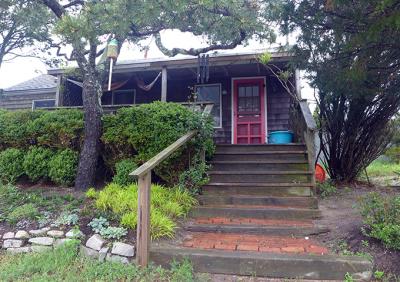At Lazy Point, Longer Land Leases May Be Coming

Real estate at Lazy Point in Amagansett is an East End anomaly. While the sandy acreage faces Gardiner’s Bay and juts up against Napeague Harbor, the land on which the relatively small houses there sit comes at a modest rental fee because it is owned by the East Hampton Town Trustees.
At their meeting on Monday, the trustees discussed a significant change in the landlord-tenant agreement, one that is likely to be welcomed.
The trustees, who derive approximately half their annual revenue from leasing land at Lazy Point, and a transfer fee on the sale of houses there, discussed the possibility of extending leases from the present one-year term to as many as 30 years, or perhaps more.
Extending the leases, said Brian Byrnes, a trustee, “will give the folks down at Lazy Point the opportunity, if they should choose to do so, to get a mortgage. I’m talking about a 25 or 30-year lease. . . . I don’t want to kick the can down the road forever on this.”
The trustees increased the annual rent in 2013 from $1,000 to $1,500. Relations were strained the following year when the trustees again planned a steep increase, but the proposal was abandoned when homeowners complained. By 2015, the trustees were intent on at least a closer alignment of the rent for their small lots with what they consider the market value. During negotiations that lasted nearly a year, tenants argued that while their rent was modest in comparison with elsewhere on the South Fork, the fact that they did not own the land precluded their obtaining mortgages. The sharp increase proposed was abandoned in favor of a 10-percent raise followed by annual 2-percent increases and an increase in the transfer fee.
At the time, some residents also complained about the uncertainty of year-to-year leases, which they said rendered long-term decisions about investing in improvements or renovations difficult. (Another change resulting from the 2015 negotiations was the automatic renewal of leases provided tenants were in compliance with terms.)
Past efforts to enact sharp rent increases “really backfired,” said Jim Grimes, a trustee, and it is important that they act now, he said, citing an application from a lessee to elevate a house to comply with Federal Emergency Management Agency regulations. “If we’re going to start considering FEMA compliance, I think as landlords we’ve got to make a long-term commitment to our tenants,” he said.
At present, “It’s only somebody that has cash that they can put down, or has another asset in the Town of East Hampton to leverage to buy these things,” Mr. Grimes said of the houses at Lazy Point. “It completely locks out the local person, or even a family member here. If you’ve got a property that needs upgrades, needs a renovation, unless that family member has the money to do it out of pocket, that option is not there for them.”
Chris Carillo, the trustees’ attorney, said they must determine whether financial institutions would lend money based on 25 or 30-year leases. “I’ve read in some places that maybe they require five years more than a conventional 30,” he said. “We should confirm that.”
“And we have to try to understand if there will be any consequences,” said Francis Bock, the clerk of the trustees. As an unintended consequence, John Aldred said, “We might trigger a building boom.”
But the impetus is “to open it to local people,” said Rick Drew, who owns a house at Lazy Point and was a leader in negotiating with the trustees in 2015, the year he was elected.
The trustees said that they would meet with residents to discuss the idea, probably after Memorial Day.
